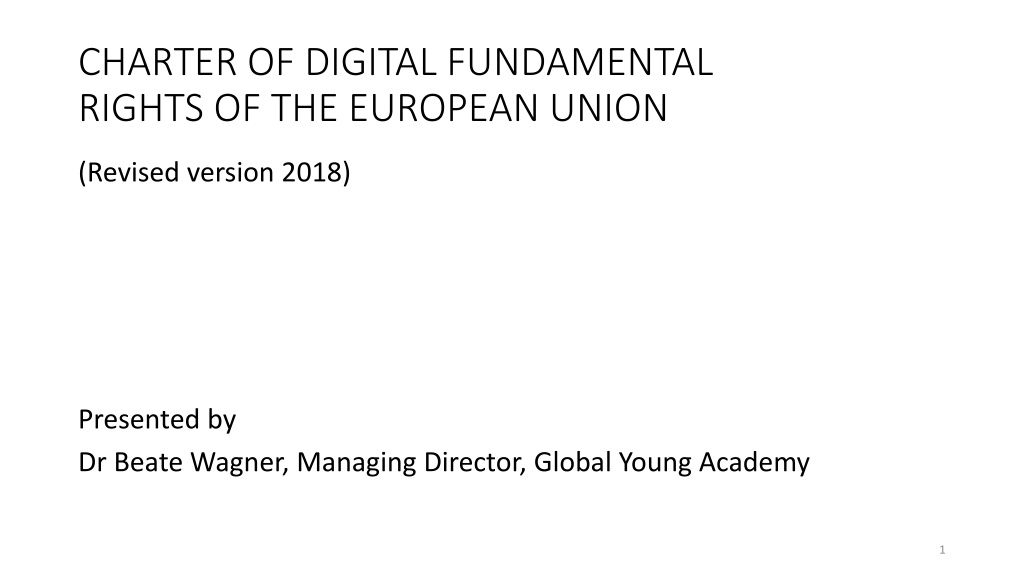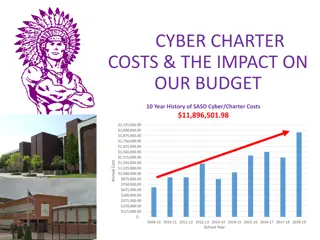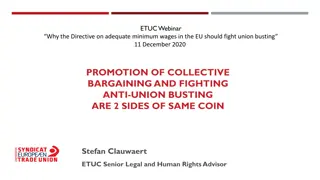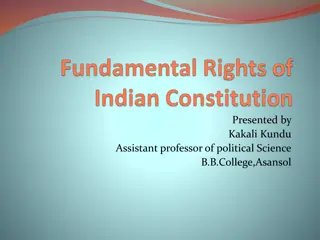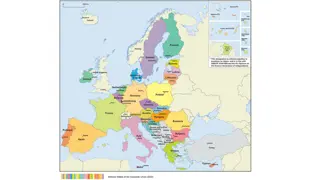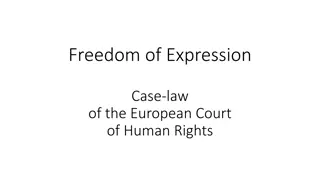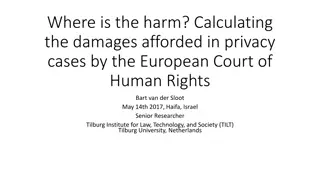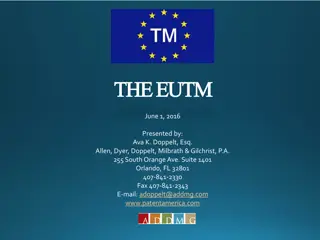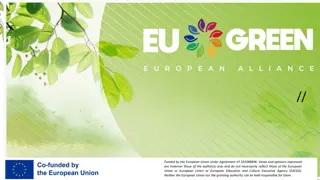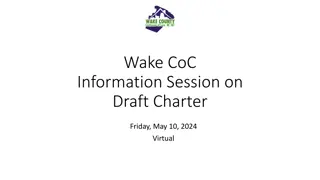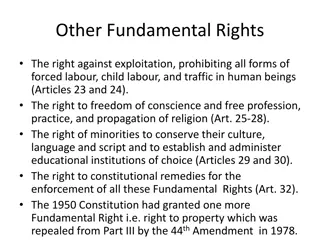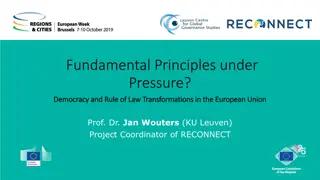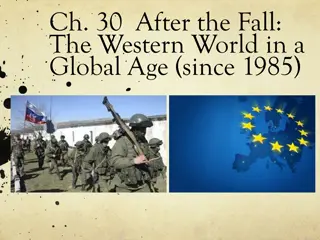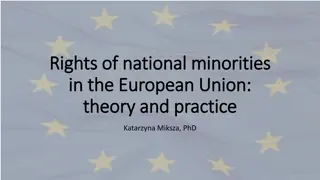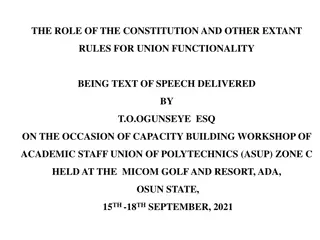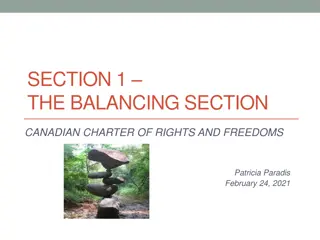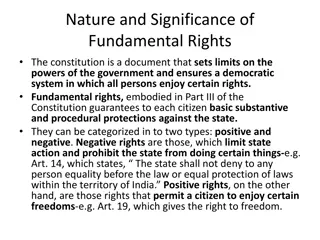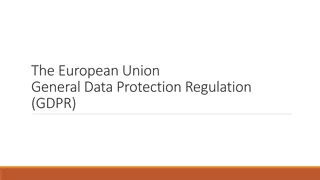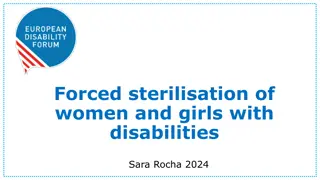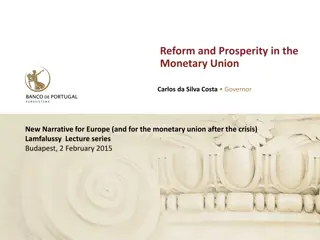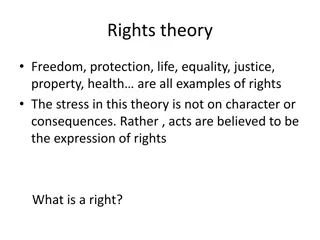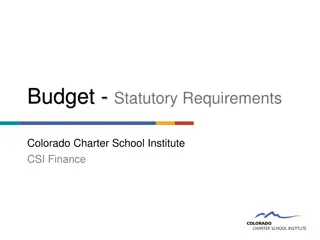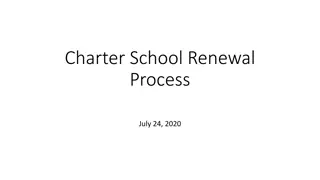Proposal for Enhancements to the Charter of Fundamental Rights of the European Union
This proposal outlines additions to the Charter of Fundamental Rights of the European Union, focusing on freedom of expression and information, limitations on censorship, and ethical principles for automated systems and decisions. The aim is to ensure the protection of fundamental rights in the digital world by emphasizing human involvement in decision-making processes.
Download Presentation

Please find below an Image/Link to download the presentation.
The content on the website is provided AS IS for your information and personal use only. It may not be sold, licensed, or shared on other websites without obtaining consent from the author. Download presentation by click this link. If you encounter any issues during the download, it is possible that the publisher has removed the file from their server.
E N D
Presentation Transcript
CHARTER OF DIGITAL FUNDAMENTAL RIGHTS OF THE EUROPEAN UNION (Revised version 2018) Presented by Dr Beate Wagner, Managing Director, Global Young Academy 1
Our group/the initiators Jan Philipp Albrecht MdEP (B ndnis 90 / Die Gr nen) Gerhart R. Baum Rechtsanwalt Heinz Bude Professor f r Soziologie, Universit t Kassel Rebecca Casati Journalistin, Lektorin Johannes Caspar Hamburgischer Beauftragter f r Datenschutz und Informationsfreiheit Giovanni di Lorenzo Mitglied des Kuratoriums der ZEIT-Stiftung Michael G ring Vorstand, ZEIT-Stiftung Johnny Haeusler Autor und Unternehmer G tz Hamann Journalist, DIE ZEIT Byung-Chul Han Professor f r Kulturwissenschaft, Universit t der K nste Berlin Jeanette Hofmann Wissenschaftszentrum f r Sozialforschung Berlin Yvonne Hofstetter CEO, Teramark Technologies GmbH, M nchen Christoph Keese CEO, Axel Springer hy GmbH Wolfgang Kleinw chter ehemaliger ICANN-Direktor und Professor f r Internetpolitik, Universit t Aarhus Sascha Lobo Christoph M llers Professor f r ffentliches Recht, HU Berlin Daniel Opper Projektleiter Bucerius Lab, ZEIT- Stiftung Bernhard P rksen Professor f r Medienwissenschaft Frank Rieger Internetaktivist und Sprecher des Chaos Computer Clubs Nikolaus Schneider Theologe Martin Schulz MdB (SPD) Malte Spitz Autor, Aktivist und Datensch tzer Beate Wagner Managing Director, Global Young Academy Heinrich Wefing Ressortleiter Politik, DIE ZEIT Ulrich Wilhelm Juli Zeh Schriftstellerin 2
What do we want to add to the CHARTER OF FUNDAMENTAL RIGHTS OF THE EUROPEAN UNION ? Four Examples Article 11 Freedom of expression and information 1. Everyone has the right to freedom of expression. This right shall include freedom to hold opinions and to receive and impart information and ideas without interference by public authority and regardless of frontiers. 2. The freedom and pluralism of the media shall be respected. ARTICLE 4 (FREEDOM OF EXPRESSION AND THE PUBLIC SPHERE) (1) Every person has the right to freedom of speech and expression in the digital world. There shall be no censorship. (2) This right may be limited by the provisions of general laws. (3) Operators of public chatrooms hold the responsibility for protecting the right to freedom of expression. They must ensure that the fundamental rights and duties stipulated in this Charter are observed according to the law. 3
ARTICLE 5 (AUTOMATED SYSTEMS AND DECISIONS) (1) Ethical principles shall only be formulated by human beings, and decisions that impact fundamental rights shall only be made by human beings. (2) The responsibility for automated decisions must lie with a natural or legal person. (3) The criteria leading to automated decisions, in cases such as digital profiling, must be made transparent. (4) Every person subject to an automated decision that has a significant impact on his or her life shall have the right to have an independent review and ruling conducted by a human being. (5) Decisions about life and death, physical integrity, and the deprivation of liberty shall only be made by human beings. (6) The use of artificial intelligence and robotics in areas sensitive to possible fundamental rights vio- lations must be subject to social debate and regulated by legislation. 4
CHARTER OF FUNDAMENTAL RIGHTS needs DIGITAL FUNDAMENTAL RIGHTS Article 2 (Liberty) Article 6 Right to liberty and security Every person has the right to freedom of information and communication. This includes the personal right not to know. Everyone has the right to liberty and security of person. 5
Fundamental rights need to be spelled out more explicitly Article 8 ARTICLE 7 (PRIVACY, CONFIDENTIALITY AND DATA PROTECTION) Protection of personal data 1. Everyone has the right to the protection of personal data concerning him or her. 2.Such data must be processed fairly for specified purposes and on the basis of the consent of the person concerned or some other legitimate basis laid down by law. Everyone has the right of access to data which has been collected concerning him or her, and the right to have it rectified. 3. Compliance with these rules shall be subject to control by an independent authority. (1) Every person has the right to the protection of his or her data and the right to privacy. (2) Personal data may only be collected and processed from the individual in good faith and for specific purposes, if there is a legal basis for so doing. The processing of the data must be made safe, fair, and transparent with the use of state-of-the-art technology. (3) The right of the individual to erasure of data, correction of data, the right of objection, and the right to access data and personal information must be guaranteed. (4) Every person has the right to make a digital fresh start. This right is limited by the public s legitimate right to know. (5) Every person has the right to a home life free from surveillance. (6) Every person has the right to take suitable measures to protect his or her data and communications from third-party access. (7) There may be no acts of unjustified and unauthorized surveillance. ARTICLE 8 (SECURITY OF INFORMATION SYSTEMS) (8) Compliance with these statutes shall be monitored by independent institutions. The integrity and confidentiality of information systems and related infrastructure must be guaranteed and protected through adequate technical and organisational measures. 6
join the debate https://digitalcharta.eu/wp-content/uploads/Digital_Charter_english_2018.pdf https://digitalcharta.eu/ https://re-publica.com/en/session/digitalcharta-continued-wir-prasentieren- uberarbeitete-fassung-2018 Beate.wagner@globalyoungacademy.net 7
